Sustainability and green-practices are surmountable issues faced by today’s power companies in the line of global issues and consequences associated with global warming. Shell as an energy company is no exception too, with the intention of spreading their green-initiatives, raising awareness and promoting technology-transfer of Eco-friendly power solutions to our everyday life. The transport industry is one such area of energy-sustainability and the Shell Eco-challenge addresses this through an event organized internationally to spread the message.
No better way to spread the green initiative than challenging schools and sponsoring them to build Eco-friendly vehicles to compete in the Shell Eco-Marathon challenge. The Eco-marathon event see student teams from around the world to design, build and test ultra energy-efficient vehicles. With annual events first in the Americas, then Europe and Asia, the winners are the teams that go the furthest using the least amount of energy. The events spark debates about the future of mobility and inspire young engineers from these institutions to push the boundaries of fuel efficiency.
The public event here was held at the SCAPE Playspace at Orchard Link just opposite Orchard cine-leisure and the youth park. It saw an engineering introduction and showcase of six locally designed Eco-friendly racing cars which participated in the various categories in the Shell Eco-marathon challenge as youth-led projects. These cars were designed and created by students from the Institute of Technical Education College West, Ngee Ann Polytechnic and Nanyang Technological University. Surprisingly, team NUS did not participate in the event, though I am only aware of their racing participation in the formula student category with NUS racing which does not fall under the purview of green-fueled cars.
The event started first with a welcome of the event Guest-of-Honor, Mr Teo Ser Luck, Minister of State, Ministry of Trade and Industry. Keynotes were presented by Straits Times and Ms Goh Liang Choo, the Downstream Controller Eastern Region, Shell Singapore, reaffirming the green initiative of this Eco-marathon event. A drive through showcase of the Eco-cars ensued thereafter led by their respective team members from each educational institution with technical explanations of each car introduced by the event emcee. The ITE team bagged a respectable number of awards for their efforts and contributions with the prize money presented by our minister on stage himself.
After the stage showcase, you get to meet the teams in person at their various display booths. I got to know the teams and lecturers, discussing and sharing on matters about engineering in general in relation to environmentally friendly cars and the importance of green initiatives. It’s nice to see the teams inspired to build these cars out of their own time out of school time as an co-circular activity supported by their seniors. Notably, the racing team comprises of engineering students from a combination of various engineering disciplines such as chemical, electrical engineering students and predominantly, mechanical engineering. Given my experience in many of such races as an engineering student myself in the UK (UK-Greenpower and world solar challenge team Cambridge), it’s nice to being able to discuss and share experiences with team down to the technical level.
While most teams are technically capable, I noticed all the teams distinctly lack a business support team giving rise to common lack of funding and sponsorship for such projects. This particularly more challenging in Singapore where such green-initiatives are often unheard of and secondary to most sponsor-potential corporations here. This is in stark contrast to the stronger support for green technologies abroad, particularly in Europe where green initiatives are led from the government top-down with carbon targets and relevant environmental polices. The lack of funds cripples teams to the extent of being unable to upgrade their cars for future races or even missing races down in their calendar (such as team NTU for next year’s world solar challenge).
The mindset of the racing teams here in Singapore is a pure-engineering one. However, for any successful racing team, a dedicated engineering team is as important as a dedicated business team (such as non-technical students from business or accounting departments in the institution to better address the team financials in a real-world enviroment) to market the team and pull funds and sponsors in for the upcoming racing seasons. I hope these team practices I shared from my own racing team will better equip the local teams here with a better understanding of their needs and guide them out of their financial problems.
Thankfully, going with the Eco theme and initiative, there were a couple of companies showcasing and selling several green product such as composite Bamboo bicycles, coupled with post-event games. The event carried on throughout the rest of the day with a buffet lunch for attendees, as well as a live-band playing throughout the rest of the afternoon.
In all, I feel the carnival is an excellent way to showcase of technical excellence and promoting interest in Eco-vehicles in Singapore, particularly the field of engineering too, all to kick-start green ideologies and raise environmental awareness, especially at a young age to the public and driving the message from the support from educational institutions the for increased public acceptance. It also paints Shell’s continued effort in promoting the green-initiative as an energy company, also given the ever-looming global consequences of climate change in relation to global warming.
Kudos to Shell Singapore for organizing this, it would not had been achievable without their initiative.

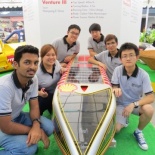
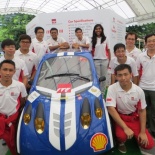
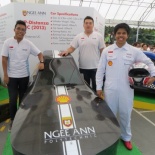
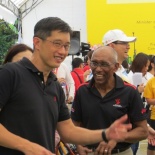
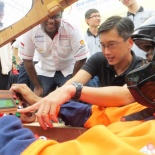
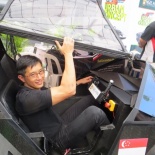
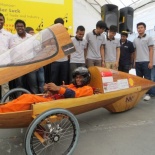
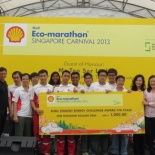
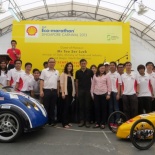
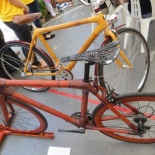
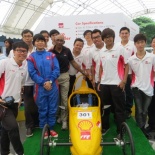
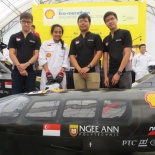
[…] which won this year’s Shell Eco-marathon challenge. You might remember my first look at the Eco-challenge a couple of years back. Let’s take a look at their engineering labs, and a showcase of Temasek Polytechnic Eco […]